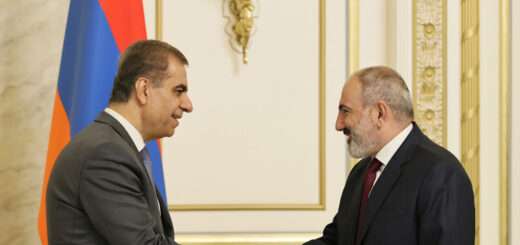Pashinyan Continues to Defend Land Handover to Azerbaijan

At Least 2 CSTO Member States Assisted Azerbaijan in the 2020 War, Pashinyan Says
Against the backdrop of weeks-long protests against his border policies, Prime Minister Nikol Pashinyan again touted the decision to delimit the border between Armenia and Azerbaijan by ceding four villages to Azerbaijan in the Tavush Province.
Pashinyan told lawmakers in parliament on Wednesday that the April 19 agreement that saw the unilateral handover of the Tavush villages was a significant achievement for Armenia, and described it as a blueprint — or a guideline — for delimiting other sections of the border.
Azerbaijan did not return any Armenian territories it is currently occupying through the said agreement, which according to the Armenian government was based on the borders outlined by the 1991 Alma Ata declaration. Baku continues to backtrack on its commitment in the process and has not publicly recognized Armenia’s territorial integrity as Yerevan and Pashinyan have so hastily on numerous occasions.
“The agreement cannot fail proceed,” Pashinyan said. “I don’t see such a possibility. It can go ahead slowly, it can go a little faster, but the process must progress because the two sides have already signed [the document.]”
Pashinyan then went on to show a 1976 Soviet military map, which he said served as “a legal basis” for his transfer of land to Azerbaijan.
The April 19 decision and the subsequent verification of it last year by a commission headed by the Armenian and Azerbaijani deputy prime ministers sparked the “Tavush for the Homeland” movement, whose leader, Archbishop Bagrat Galstanyan, has called for Pashinyan’s resignation.
Pashinyan told lawmakers that before making the decision on the border delimitation, “dozens of discussions were held in the Armenian government and in the Security Council and other formats.”
“In fact, these decisions and approaches have undergone legal review, to determine whether our decisions are de-jure justified. And I have no doubt that these decisions are legally justified, since their legality is recorded by our relevant state institutions, and there simply cannot be any doubt,” Pashinyan insisted.
The prime minister also touched on the growing rift between his government and the Russia-led Collective Security Treaty Organization. Earlier this year he announced that Yerevan would freeze its membership in the group, while last month the foreign ministry announced that it would discontinue its financial obligations.
Pashinyan told parliament that at least two CSTO member-states participated and assisted in the 2020 War against “their ally” Armenia.
“I know that at least two CSTO member countries participated in preparing for war against us. These countries may have created an illusion that they wanted to help us or that they allegedly helped us,” said Pashinyan claiming that the issue of Karabakh had been “closed” for these countries and their ultimate goals was “eradicate the independent Republic of Armenia.”
Pashinyan then referenced remarks made by Belarus President Alexander Lukashenko, who, during a visit last week to occupied Shushi in Artsakh, boasted of his country’s support in remarks addressed to his Azerbaijani counterpart Ilham Aliyev.
“I remembered our conversation before the [Nagorno-Karabakh] war [in 2020], before your battle for freedom, when we were talking philosophically at lunch together. It was then that we came to the conclusion that a war can be won,” Lukashenko said in Shushi last week, addressing Aliyev.
“With this border delimitation process, we have deprived many people of the opportunity to incite border clashes,” Pashinanyan told lawmakers, recalling his own words from 2022 when he said that “if we manage to preserve Armenia’s statehood for one to two years, then its existence will be guaranteed for the next 50-100 years.”







